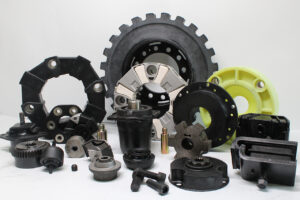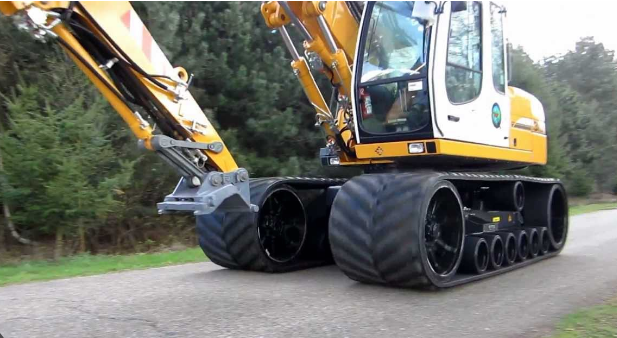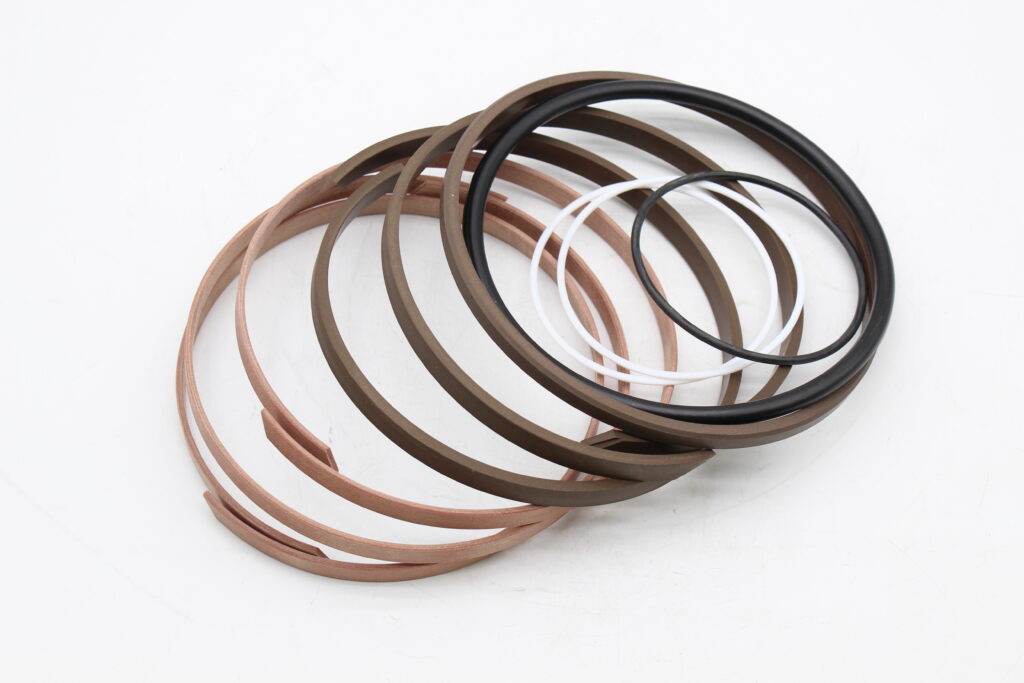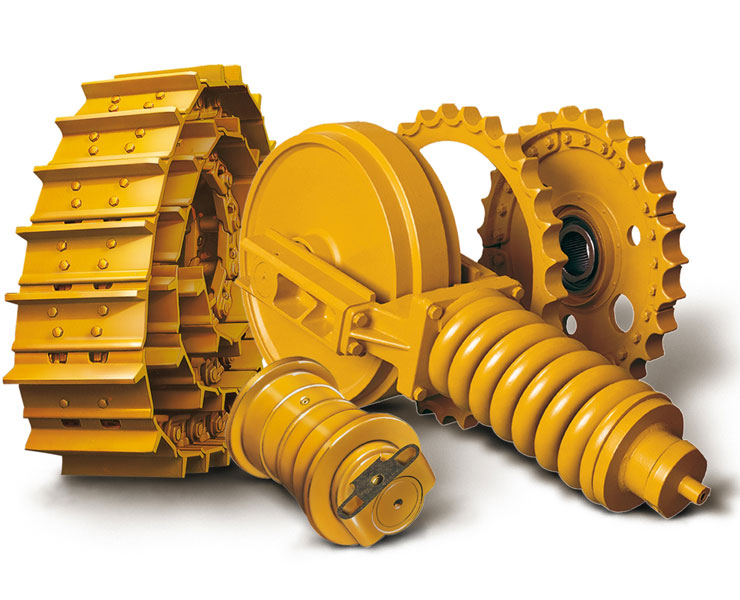Introduction: The Importance of Essential Excavator Parts
Excavators are the backbone of many construction projects, ranging from digging foundations to demolishing structures. The efficiency and longevity of an excavator depend not just on the machine itself but also on the quality and condition of its parts. Having the right excavator parts on hand is crucial for maintaining equipment performance, reducing downtime, and ensuring the safety of the operators. In this blog, we will discuss the top 10 excavator parts every contractor should have, explore their functions, features, and provide valuable purchasing tips. Additionally, we’ll share real-world examples of how these parts can make a difference on the job site.
The Top 10 Essential Excavator Parts
1. Hydraulic Pump Couplings

Function and Importance:
The hydraulic system is the heart of an excavator, powering its essential functions such as lifting, digging, and maneuvering. Central to this system is the hydraulic pump, which generates the necessary hydraulic pressure to drive the machine’s operations. However, the smooth transmission of power from the engine to the hydraulic pump relies heavily on one critical component: the hydraulic pump coupling.
Hydraulic pump couplings serve as the vital link between the excavator’s engine and the hydraulic pump, ensuring that power is transferred efficiently and without interruption. A well-functioning coupling is crucial for maintaining the excavator’s performance, as any misalignment, wear, or failure can lead to reduced efficiency, increased vibration, and potentially costly downtime.
Key Features and Buying Tips:
- Material Composition:
- Durability: The coupling should be made from high-strength materials such as steel, cast iron, or high-grade elastomers that can withstand the stress and torque generated by the excavator’s engine.
- Corrosion Resistance: In environments where moisture or chemicals are present, a coupling with corrosion-resistant properties is essential to prevent degradation over time.
- Design Type:
- Flexible vs. Rigid: Flexible couplings allow for some misalignment between the engine and the hydraulic pump, reducing the risk of damage due to minor misalignments or vibrations. Rigid couplings, while less forgiving, can be more suitable for applications where precision alignment is achievable and necessary.
- Torsional Dampening: Couplings with built-in torsional dampening help absorb shocks and vibrations, protecting both the pump and the engine from excessive wear.
- Alignment Tolerance:
- Axial, Angular, and Radial Tolerances: The coupling should accommodate the specific alignment tolerances required by your equipment. Couplings with higher tolerance flexibility are better suited for applications where perfect alignment is difficult to maintain.
- Size and Fit:
- Bore Size and Shaft Fit: Ensure that the coupling’s bore size matches the shafts of both the engine and the hydraulic pump. The fit should be snug but not overly tight, allowing for secure power transmission without slippage.
- Torque Rating: The coupling must be capable of handling the torque produced by the engine without failure. Selecting a coupling with a torque rating slightly above your machine’s requirements can add a margin of safety.
- Temperature and Environmental Resistance:
- Operating Temperature Range: Choose a coupling that can withstand the operating temperatures of your excavator’s hydraulic system, especially if you’re working in extreme conditions.
- Environmental Seals: For excavators operating in harsh environments, consider couplings with seals that protect against dirt, dust, and moisture.
Buying Tips for Hydraulic Pump Couplings
- Understand Your Equipment Specifications:
- Before purchasing a coupling, thoroughly review your excavator’s specifications, including engine power, hydraulic pump requirements, and operational conditions. This will help you choose a coupling that is appropriately rated and compatible with your equipment.
- Choose Reputable Brands:
- Consider Aftermarket vs. OEM:
- While OEM (Original Equipment Manufacturer) couplings are designed specifically for your machine, aftermarket options can offer similar quality at a lower cost. However, ensure that the aftermarket coupling meets or exceeds OEM specifications.
- Consult with a Specialist:
- If you’re unsure about the right coupling for your excavator, consult with a hydraulic system specialist or a trusted supplier. They can provide recommendations based on your specific needs and operational environment.
- Evaluate Longevity and Maintenance Needs:
- Consider the coupling’s expected lifespan and maintenance requirements. Some couplings may require regular inspections or replacement of wear parts, while others are designed for long-term, low-maintenance use.
- Check for Warranty and Support:
- Ensure that the coupling comes with a manufacturer’s warranty, and that technical support is available if needed. This can be invaluable if you encounter issues after installation.
2. Hydraulic Hoses
Function and Importance:
Hydraulic hoses are responsible for transmitting hydraulic fluid between components of the excavator’s hydraulic system. These hoses must withstand high pressures and extreme conditions to ensure the smooth operation of the machine.
Key Features and Buying Tips:
- Material: Opt for hoses made from synthetic rubber or thermoplastic with steel-reinforced braiding for added strength.
- Pressure Rating: Ensure the hose can handle the maximum operating pressure of your hydraulic system.
- Flexibility: A good hydraulic hose should be flexible enough to accommodate the movements of the excavator without cracking.
- Brand Recommendation: Consider Parker Hannifin and Gates for high-quality hydraulic hoses.

3. Rubber Tracks
Function and Importance:
Rubber tracks provide traction and stability to the excavator, especially on softer or more delicate surfaces like asphalt or lawns. They are essential for minimizing ground damage and ensuring smooth movement across various terrains.
Key Features and Buying Tips:
- Tread Pattern: Choose a tread pattern based on the primary surface type you’ll be working on. For example, a more aggressive tread is better for muddy conditions.
- Durability: Look for tracks made from high-grade rubber compounds with reinforced steel cords.
- Size and Fit: Ensure the tracks are the correct size for your specific excavator model.
- Brand Recommendation: Bridgestone and Camso are leading manufacturers known for their durable and high-performance rubber tracks.

4. Engine Parts (Filters, Belts, etc.)
Function and Importance:
The engine is the heart of the excavator, and keeping it in peak condition is vital for performance. Essential engine parts like air filters, fuel filters, belts, and hoses must be regularly maintained and replaced to prevent engine failure and costly repairs.
Key Features and Buying Tips:
- Quality: Always opt for OEM (Original Equipment Manufacturer) parts to ensure compatibility and longevity.
- Routine Maintenance: Stock up on essential engine parts and schedule regular maintenance to prevent unexpected breakdowns.
- Brand Recommendation: Brands like Cummins, Caterpillar, and Perkins offer reliable engine parts that meet the highest industry standards.

5. Seals and Gaskets
Function and Importance:
Seals and gaskets play a critical role in preventing leaks and ensuring the integrity of various systems within the excavator, including the hydraulic system, engine, and cooling system. Without effective seals, fluid leaks can lead to system failures and costly repairs.
Key Features and Buying Tips:
- Material: Choose seals and gaskets made from materials compatible with the fluids they’ll be exposed to, such as oil-resistant rubber for engine gaskets.
- Fit: Ensure the seals and gaskets are the correct size and shape for your excavator model.
- Brand Recommendation: SKF and NOK are reputable brands known for producing high-quality seals and gaskets.

6. Hydraulic Cylinders
Function and Importance:
Hydraulic cylinders are responsible for converting hydraulic energy into mechanical force, enabling the movement of the excavator’s boom, arm, and bucket. The performance and reliability of these cylinders are crucial for precise and powerful operation.
Key Features and Buying Tips:
- Bore and Stroke: Choose cylinders with the appropriate bore and stroke dimensions to match your machine’s specifications.
- Material: Opt for cylinders made from high-strength steel with corrosion-resistant coatings.
- Maintenance: Regularly inspect and maintain the cylinders to prevent leaks and ensure smooth operation.
- Brand Recommendation: Consider manufacturers like Caterpillar and Bosch Rexroth for durable and high-performance hydraulic cylinders.

7. Electrical Components (Wiring Harnesses, Sensors, etc.)
Function and Importance:
The electrical system of an excavator controls everything from the ignition to the operation of the hydraulic system. Key electrical components like wiring harnesses, sensors, and control modules must be in top condition to ensure the smooth functioning of the machine.
Key Features and Buying Tips:
- Durability: Choose components that are resistant to moisture, heat, and vibration.
- Compatibility: Ensure the electrical components are compatible with your excavator’s make and model.
- Brand Recommendation: Bosch and Delphi are well-regarded for their reliable and durable electrical components.

8. Buckets
Function and Importance:
Buckets are arguably the most used attachment on an excavator, and having the right bucket for the job can greatly improve efficiency. Whether it’s digging, trenching, or grading, the right bucket ensures optimal performance for the task at hand.
Key Features and Buying Tips:
- Type: Choose the bucket type (e.g., trenching, grading, rock) based on the specific job requirements.
- Material: Opt for high-strength, wear-resistant steel to ensure the bucket can withstand heavy use.
- Size: Ensure the bucket size is appropriate for the capacity and power of your excavator.
- Brand Recommendation: Caterpillar and Komatsu offer a wide range of high-quality buckets designed for different applications.

9. Cooling System Components (Radiators, Fans, etc.)
Function and Importance:
The cooling system is essential for maintaining the engine at an optimal operating temperature. Components like radiators, fans, and coolant hoses must be in good condition to prevent overheating, which can cause severe engine damage.
Key Features and Buying Tips:
- Material: Choose radiators and fans made from durable, heat-resistant materials like aluminum and high-strength plastic.
- Compatibility: Ensure the cooling components are compatible with your excavator model and engine type.
- Brand Recommendation: Consider brands like Denso and Behr for reliable cooling system components.

10. Undercarriage Parts (Rollers, Idlers, Sprockets, etc.)
Function and Importance:
The undercarriage is one of the most
critical and heavily used parts of an excavator, comprising components like rollers, idlers, sprockets, and track chains. These parts are essential for the smooth movement and stability of the excavator across different terrains.
Key Features and Buying Tips:
- Material: Choose undercarriage parts made from high-strength steel with wear-resistant coatings.
- Maintenance: Regularly inspect and maintain the undercarriage to prevent premature wear and tear.
- Brand Recommendation: Berco and ITM are leading brands known for their durable and high-quality undercarriage components.

Conclusion: Maximizing Excavator Efficiency and Longevity
In the construction industry, time is money, and having the right excavator parts on hand can make all the difference in completing a project on time and within budget. The top 10 parts we’ve discussed—couplings, hydraulic hoses, rubber tracks, engine parts, seals and gaskets, hydraulic cylinders, electrical components, buckets, cooling system components, and undercarriage parts—are essential for maintaining the performance, safety, and reliability of your excavator.
Investing in high-quality parts, performing regular maintenance, and understanding the specific needs of your projects will help you maximize the efficiency and longevity of your excavator. Whether you’re working on a small residential project or a large-scale industrial operation, these essential parts will ensure that your equipment is always ready to handle the demands of the job.
By carefully selecting and maintaining these components, contractors can reduce downtime, prevent costly repairs, and keep their projects on track, ultimately leading to greater success and profitability in the competitive world of construction.





